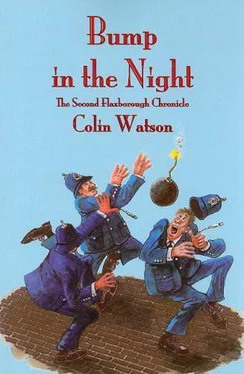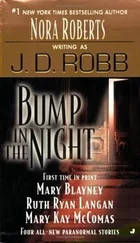“Whoever could have done that?”
“Those Mackenzie kids, I expect.”
“Not that, they couldn’t. It’s metal.”
“Here, do you know, I thought I heard something in the night...”
“A sort of slamming noise?”
“A bang. Just outside.”
“That’s right. It was.”
“I wonder if...”
“Well I never!”
And so the report eventually reached Chief Inspector Larch that the statue of Alderman Berry had been decapitated and that two residents of houses opposite the railed courtyard in which the memorial stood had heard an explosion during the night. He drove immediately to the scene, accompanied by Worple.
The bronze figure had been transformed into something a surrealist might have found eminently satisfying. The spread hand of its down-reaching arm indicated the recumbent head, as if in proud witness to a feat of strength. The alderman’s other hand, robbed of the cheek it had supported in an attitude of pious bloody-mindedness, now stuck erect in jaunty salute. The statue of the town’s foremost temperance pioneer could not have been more shockingly desecrated had a brazen beer barrel been riveted between its feet.
Worple stared at the topped effigy for fully half a minute. “It quite turns you up, doesn’t it, sir?” he said at last.
“No,” said Larch. He faced the other way, scowling at the houses that overlooked the chapel courtyard and searching his memory for the names of such of their occupants as had incurred his displeasure in the past.
The sergeant knelt and examined the head.
It appeared to have been cleanly fractured except for an area at the back of the neck where the metal was twisted and jagged. The charge must have been placed there, like a poultice. It had been enough merely to smash a smallish hole and to topple, rather than blast, the head from the trunk.
Worple stood and gave Larch his opinion, adding that explosions were funny things and he wouldn’t rule out the possibility of damage coming to light further afield when a thorough search was made.
“Never mind that,” retorted the chief inspector. “Just have a quick look round on the spot. There’s someone over there I’m going to have a word with if he’s in.” He strode to the gates, crossed the road and knocked on one of the doors in the grey stone terrace.
Mr Grope, as it happened, was not in. He was playing his favourite role of bearer of strange tidings to the receptive Kebble.
His wife told Larch simply that he was down in the town and started to close the door.
“Just a moment, Mrs Grope...”
She paused, regarding him suspiciously through weak, puckered-up eyes. “He’s out. You’ll have to come again.”
“I am a police officer, Mrs Grope. Might I ask you a couple of questions?” The woman made no move and Larch added firmly: “Inside, if it wouldn’t be too much trouble.”
She turned, leaving the door open for him to follow. He caught up with her in a tiny, furniture-crammed parlour that smelled of old wardrobes. Without invitation, Larch seated himself in an arm-chair.
“I’d like you to tell me if you heard anything unusual during the night. Something like a firework going off, perhaps.”
Mrs Grope shook her head. “I don’t enjoy very good hearing,” she explained huskily. “My hubby, now—he’s very keen in the ear. He says he can hear the gentleman next door picking his nose.” Her mouth dropped open to disclose toothless gums and Larch’s face was fanned with short, noiseless exhalations. Mrs Grope was laughing.
The spasm stopped as suddenly as it began and she added: “That’s just in the way of being one of his jokes, of course.”
“Was your husband here in the house all last night?”
“Eh? Yes, where else would he be? There’s nowhere to go when he gets back after the last house pictures.”
“But if he had gone out again, you might not have known, might you, if your hearing’s not too good?”
Mrs Grope looked blank. She sensed enmity.
“I do seem to remember, you know, Mrs Grope, that your husband took a night trip once before without your knowing anything about it.”
She stared at the long, pallid face above the prow-like jaw. “How do you mean?”
“He was reported missing, wasn’t he? We wasted quite a lot of time that night.”
Mrs Grope gave an angry little puff. “Well fancy throwing that up again! You know very well that was all a mistake and no harm done.” She patted the blouse over her thin chest and indignantly tugged her apron straight. “Anyway, if anyone was to blame it was Mr Biggadyke. He nearly lost father his job over that business.”
The memory was not one that she cared to be revived, least of all by a coldly aggressive policeman who seemed intent on forcing her into association with some new unpleasantness that she knew nothing about.
The incident to which he referred had happened about two years before. Grope had awakened in the middle of the night, uncomfortably aware that he had neglected, for once, to search the back row of the circle before leaving. This was a moral duty that he imposed upon himself whenever Mr Biggadyke visited the cinema in consort. ‘My ladies’, as Grope termed the morning cleaners, deserved better, he considered, than to suffer the embarrassment of chancing upon evidence of Mr Biggadyke’s diversions.
So Grope had arisen silently from his bed and had gone back to the picture house. But having repaired his lapse he inadvertently fell asleep again in one of the seats and remained there until the arrival of the charwomen some six hours later. It was then that he learned of the awakening of his wife, her descent downstairs and horrified discovery of what she took to be a suicide note on the dining-room table, and the subsequent hunt for his corpse by the half-dozen policemen whom Larch had managed to mobilize in grudging response to Mrs Grope’s hysterics.
Mrs Grope, though not sharing her husband’s addiction to rhyme, would never forget the couplet whose first line Grope had jotted down in a moment of sudden inspiration before leaving the house that night.
Weary of sights on earth, I’ll stretch my neck,
To glimpse the clouds that Luke’s high tower bedeck.
The second line, being still at the chewing over stage, had not been added. How foolish they had been made to look. And Mr Larch certainly had not believed the explanation. His present attitude showed he still thought Father had been deliberately having him on. You’re spiteful, she said to herself; that’s what you are, Mr Dishcloth-face.
Larch questioned her a little longer, but to no avail. She was by now convinced that his sole design was her self-incrimination as a deceiver of policemen. The best defence was to know nothing about anything and this line she sourly maintained until Larch abandoned her parlour.
The chief inspector found Worple still perambulating slowly around the chapel courtyard, his head bowed. Now and then he halted, gently probed the gravel with his foot and bent to peer at it. In one hand he carried an envelope.
“I think we can get back now, sergeant,” said Larch. “No use fooling round here all morning.” He spotted the envelope. “What have you got there?”
Worple held it out to him, as if offering a toffee. “Odds and ends, sir. Like we collected in the park the other week.”
Larch glanced into the envelope and eyed without much interest the bits of metal it contained. The only recognizable fragment was a tiny toothed wheel. “Might be anything,” he said.
Worple folded the envelope and put it in his pocket. “That’s so, sir. On the other hand, they might be”—he paused—“of forensic significance.”
“What? Oh yes; quite.” Larch had not caught Worple’s undertone of reproof. He was looking up at the rapidly clouding sky. “Come on, man; it’s going to rain.” They hastened to the car as the first swollen drops smacked down.
Читать дальше












